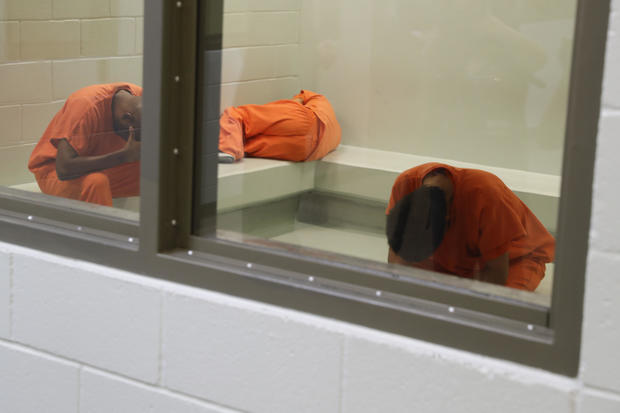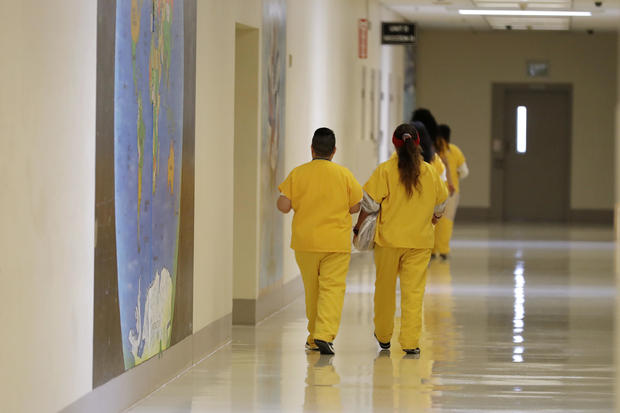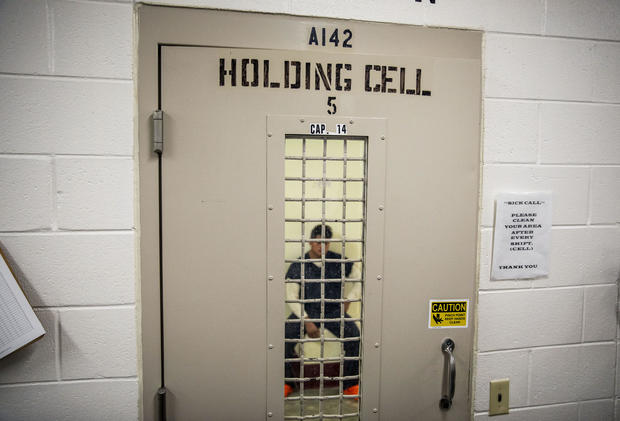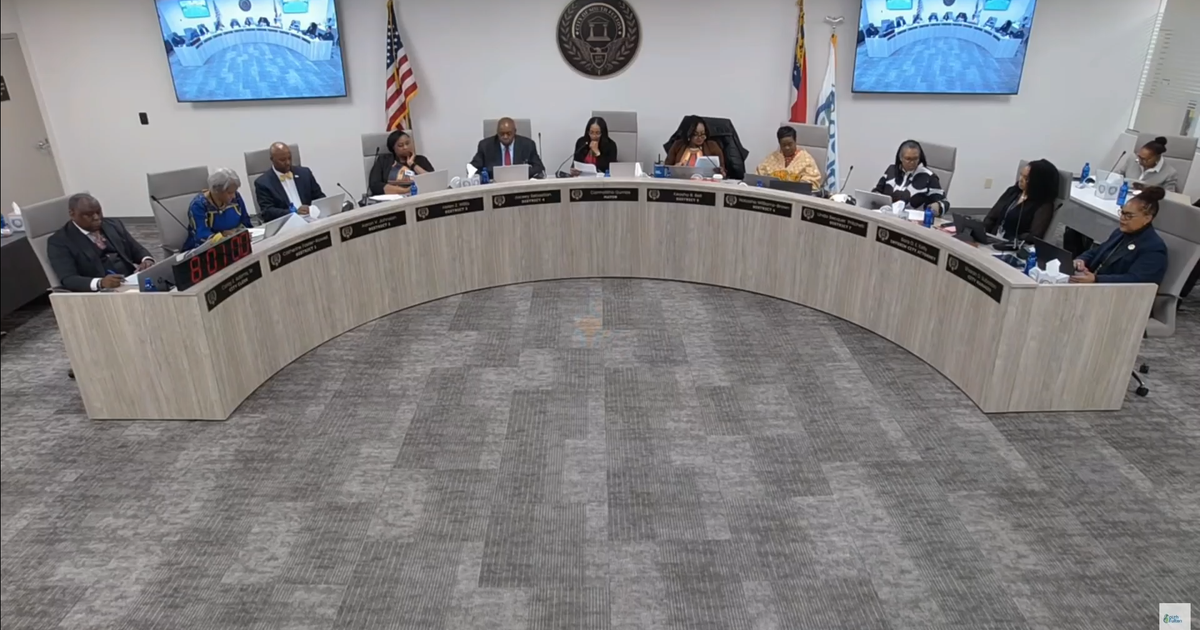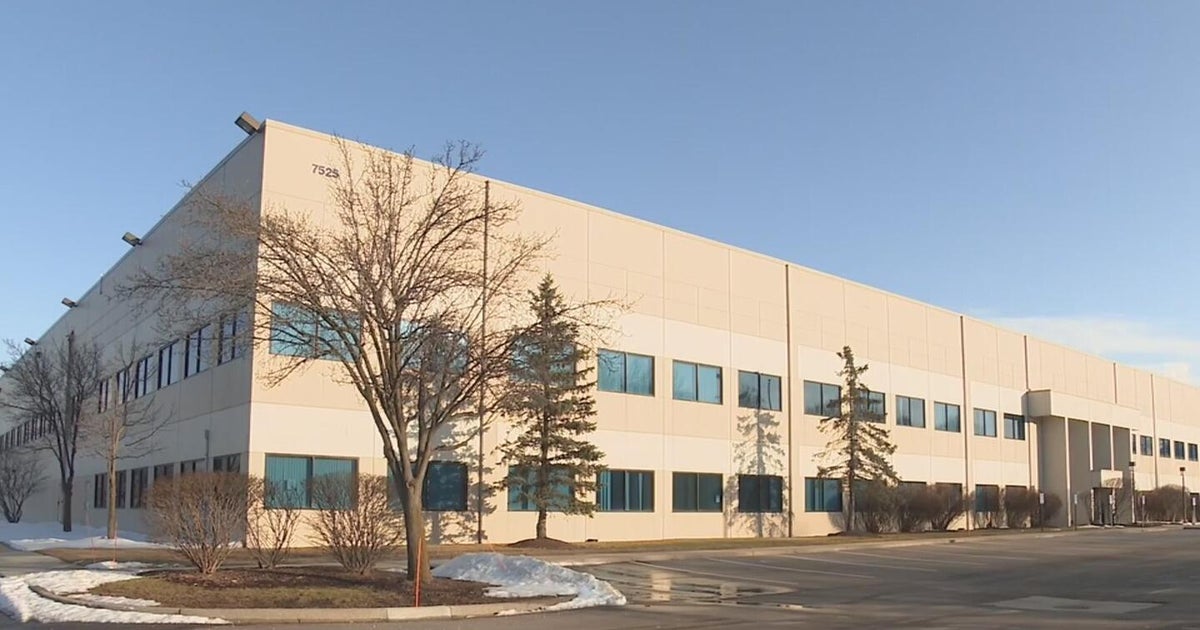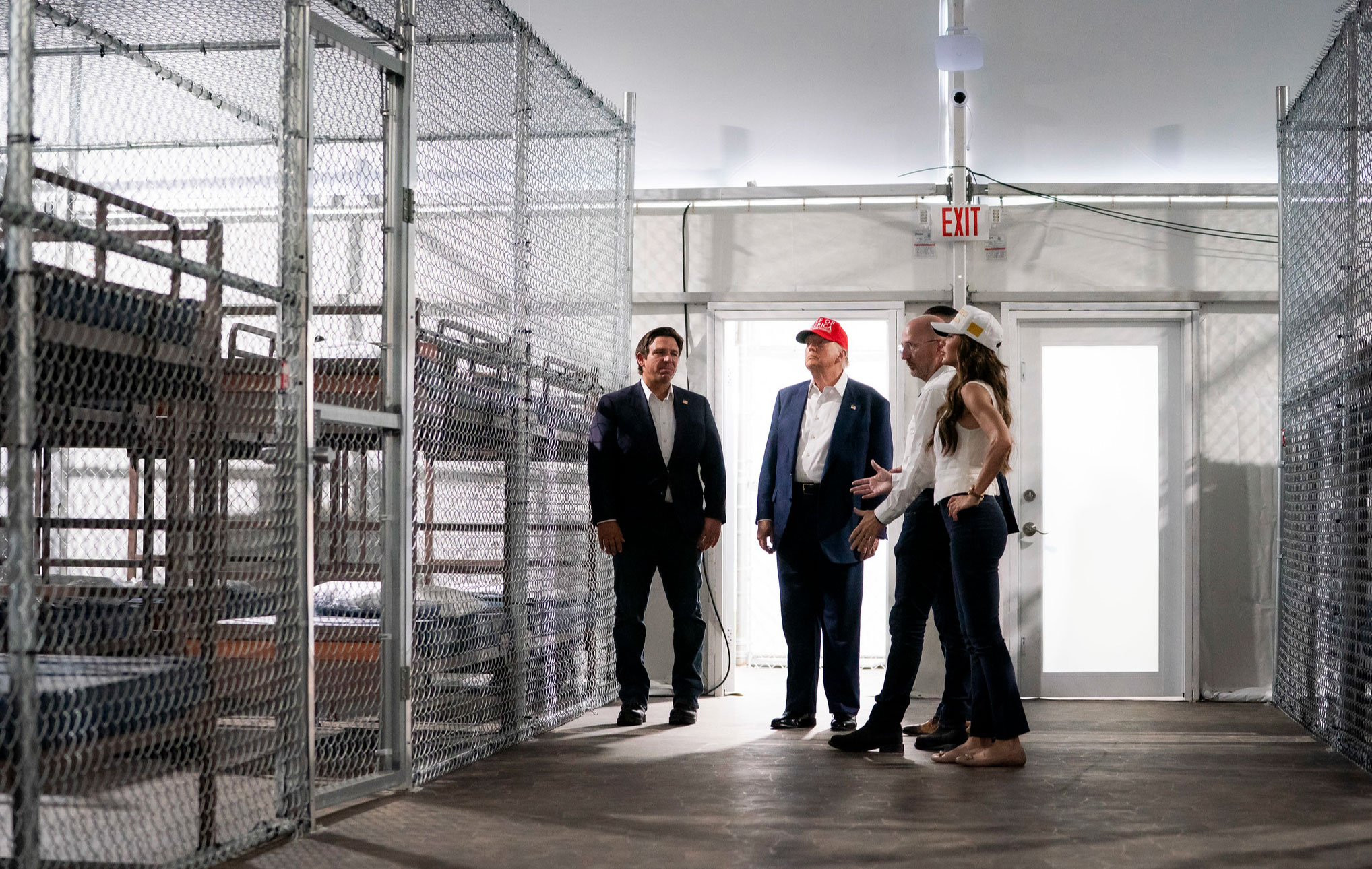"Powder kegs": Calls grow for ICE to release immigrants to avoid coronavirus outbreak
Doctors, lawyers, asylum-seekers and former officials are urging the Trump administration to release thousands of immigrants from detention to avoid a potentially deadly coronavirus outbreak in scores of facilities across the country.
Unless Immigration and Customs Enforcement (ICE) dramatically reduces the number of immigrants in its custody, experts warn the coronavirus could spread quickly among the roughly 37,000 detainees in the system.
"It's a vulnerable situation," John Sandweg, an acting head of ICE during the Obama administration, told CBS News. "You have the exact situation everyone is cautioning against. You have a bunch of people contained in a very small environment."
"Can you imagine if you get an outbreak in these detention facilities? It's going to spread like wildfire," Sandweg added.
The coronavirus pandemic has upended American life, straining the country's public health institutions and killing more than 180 people in the U.S. As the crisis has grown, ICE has faced intensifying pressure to release immigrants with chronic health conditions, pregnant women, detainees over the age of 60 and those seeking humanitarian protections who don't pose a threat to public safety.
On Wednesday, the agency announced it would stop arresting most undocumented immigrants in the U.S. who don't pose a threat to the public during the pandemic. The move is a significant shift in enforcement priorities, but doesn't address the growing calls for ICE to release many immigrants.
"ICE should try to shrink this down to only those individuals to whom they can credibly say pose a threat to public safety," Sandweg said. "The overwhelming majority of people in ICE detention don't pose a threat to public safety and are not an unmanageable flight risk."
Dr. Amy Cohen, a child physiatrist who specializes in detention conditions of migrant families, said officials need to bring the detention population to the lowest level possible to reduce the risk to detainees, guards and other ICE personnel. An outbreak would be "nearly impossible to contain," she said.
"One has to see these detention centers are powder kegs," Cohen told CBS News. "They are going to be petri dishes. They are going to be places where this virus is going to thrive and spread and where some people are going to get desperately ill — and some of those people are going to die."
Immigration lawyers have been scrambling to file requests asking ICE to release their clients, many of whom have chronic health problems. In the past few days, Texas attorney Lorena Perez McGill has filed four parole requests on behalf of clients detained in rural for-profit jails in Louisiana, including three asylum-seekers from Cuba and Venezuela and a 27-year-old Guatemalan migrant who recently tried to kill himself after spending nearly nine months in solitary confinement.
"Of course they are sitting ducks," Perez McGill told CBS News. "It's a perfect place for any illness to breathe and to thrive. Just do the math. We're talking about inadequate medical conditions."
Carlos, 33, a Cuban asylum-seeker who has been in ICE custody for about 10 months, is currently detained at the private Catahoula Correctional Center in northeastern Louisiana. He said he and other immigrants at the detention center have not received any instructions related to the pandemic. Access to hand soap is very limited and the sanitary conditions are subpar, he added.
"We don't have the means here to protect ourselves. Anyone can get sick here," Carlos, whose name has been changed to protect his identity, told CBS News during a phone call from inside the Catahoula facility. "We are very exposed to any disease here."
"Extraordinarily inadequate"
ICE's network of more than 200 detention centers and jails across the country forms the foundation of the multi-billion-dollar U.S. immigration detention system, the largest in the world. The agency has the capacity to detain more than 50,000 immigrants on any given day.
The detention centers have long been criticized for the poor medical care offered to detainees, with concerns raised not just by advocates but from within the government itself. A report by the Department of Homeland Security inspector general last year documented "inadequate" medical care at some ICE detention centers.
That criticism has intensified as President Trump's administration has moved to detain asylum-seekers for longer periods of time, often in remote and private jails in the Deep South with little oversight.
ICE has confirmed eight deaths in its custody in the past six months, including three who died of serious medical conditions or complications. Those eight deaths match the number of detainees who died in custody in the entirety of the 2019 fiscal year, and on Wednesday, BuzzFeed News reported yet another death.
The agency's detention centers have also been susceptible to communicable diseases. Last year, the agency quarantined thousands of detainees because of outbreaks of measles, mumps and the flu.
In addition to their "extraordinarily inadequate" medical services, Cohen said ICE detention centers could become breeding grounds for the coronavirus because immigrants can't take the kind of precautions recommended by experts to curb its spread, like frequent hand-washing and avoiding close contact with others.
"People are being encouraged to isolate themselves more, to be much more careful in terms of the contact that they come into with other people in other environments," Cohen said. "The detention population has no such power."
Dr. David Cennimo, a professor at Rutgers University who specializes in infectious diseases, said detention makes it challenging for immigrants to "maintain the level of personal protection" recommended by the Centers for Disease Control and Prevention (CDC) and other experts. Many detention facilities are overcrowded, and detainees gather in communal settings for meals and recreation, he added.
"What are we telling people right now? We're saying, 'Isolate, social distance yourself, stay six feet away from everybody else, don't go out,'" Cennimo told CBS News. "How much can you do that there?"
Lorilei Williams, a senior staff attorney at the Southern Poverty Law Center, said ICE facilities are susceptible to outbreaks because they are closed environments with some contact with the outside world, not because they hold immigrants.
"It doesn't necessarily mean that migrants are bringing COVID-19 from anywhere," Williams told CBS News. "It's probably going to be a staff member bringing in community spread."
In response to the pandemic, ICE said it has implemented new internal procedures, including plans to screen new detainees and isolate those with symptoms related to COVID-19. The agency has also temporarily suspended visits by family members and friends at detention centers.
ICE has yet to confirm any COVID-19 cases among its tens of thousands of detainees. However, an officer at a jail in northern New Jersey used by ICE to detain immigrants tested positive for the virus, officials announced on Thursday. Later in the day, officials revealed that a medical staffer at the ICE detention facility in Elizabeth, New Jersey had also tested positive for COVID-19.
An ICE spokesperson declined to answer directly when asked about calls to release immigrants, saying only that "no announcements have been made regarding the current detainee population."
Homero López, a New Orleans-based attorney who represents indigent immigrants detained in Louisiana, said the measures ICE has announced so far are insufficient to curtail the spread of the coronavirus, especially in the detention centers where his clients are being held. Responding to outbreaks in these facilities, he said, will be more difficult because of how isolated they are from major metropolitan areas with large medical institutions.
Releasing some detainees, López added, is the only way to reduce the risk. But he said the administration is reluctant to do so because the government doesn't see it as the humanitarian issue he believes it is.
"It's political and policy driven, to not release folks when they could be released," López told CBS News.
"100% discretion"
Sandweg, the former ICE head, said he knows what's driving the reluctance to release detainees.
"You're kind of balancing the operational needs to frankly shrink the detention population right now — which seems like a glaring, overwhelming need to me — with the political environment of this administration not wanting to be seen as soft on immigration," he said.
But Sandweg said shrinking the population is exactly what he would do if he still led the agency, focusing first on releasing people over the age of 65 and those with compromised immune systems. According to the CDC, older adults and those with underlying medical conditions like heart, lung and liver diseases and diabetes are at "increased risk" of "severe illness" if infected by the coronavirus. Earlier in the week, the American Civil Liberties Union asked a federal court in Seattle to order ICE to release a group of immigrants with health conditions.
Sandweg said he would also look to release those who do not pose a risk to a threat to public safety, including families and asylum-seekers.
As of Saturday, ICE was detaining nearly 6,000 asylum-seekers who had passed initial fear of persecution screenings. The agency was also detaining 1,542 people at two facilities designed to hold families with children.
According to government statistics, more than 14,000 of the people ICE is detaining have committed a crime and about 5,000 have pending charges. The rest, nearly 18,000, are being held for immigration violations and don't have criminal records. Since 2017, the agency has been detaining fewer and fewer immigrants with serious criminal convictions, while the number of those who committed misdemeanors, such as unlawful entry and traffic offenses, has increased, according to data compiled by Syracuse University's Transactional Records Access Clearinghouse (TRAC).
"There's a good reason to detain those who have committed violent crime," but not the rest, Sandweg said, especially during a pandemic.
Because the immigration detention system is a civil and administrative matter, ICE wields the authority to release virtually everyone in its custody. That power is recognized, Sandweg said, even "among the most hawkish immigration policy makers or officials at ICE."
"Unlike the Federal Bureau of Prisons, ICE has complete control over the release of individuals. ICE is not carrying out the sentence imposed by a federal judge," he added. "It has 100% discretion."
Under federal law, detention is only mandatory for immigrants who have committed certain crimes. One of the ways ICE can release people is by "paroling" them for humanitarian reasons or if doing so is in the public interest. They would be required to check in with ICE and supervised through ankle bracelets, unannounced home visits and telephonic meetings.
A 2009 ICE directive said asylum-seekers who entered through a port of entry should generally be paroled after establishing credible fear of persecution. But under Mr. Trump, parole grant rates have dramatically dropped, with the government arguing it needs to detain those with no criminal history because they pose a flight risk.
César Cuauhtémoc García Hernández, an immigration scholar and author, said even immigrants deemed a flight risk should be considered for release during a global pandemic, especially those with family members in the U.S., so they can continue immigration proceedings outside of detention.
"Even if they don't show up for a court date, that's to me outweighed by the very real possibility of death or serious illness," García Hernández said. "The fewer people you have in close quarters, the better."
For García Hernández, ICE needs to rapidly take drastic measures as the coronavirus continues to spread throughout the U.S. As of Thursday, the outbreak had killed more than 9,000 people worldwide, including more than 180 in the U.S., where there are more than 9,400 confirmed COVID-19 cases.
"I think it's only a matter of time before we see the number of confirmed cases grow exponentially across the United States," García Hernández said. "And I have no reason to believe that the ICE detention centers are going to be exempt."
Cohen, the psychiatrist, said detention centers are often portrayed as "islands that are disconnected from the communities around them." But she said that's not the case, and said resources in the surrounding area are "going to be zapped" in the event of an outbreak, making it more difficult for communities to respond.
"There's an intimate connection between what goes inside these facilities and what goes on in the communities around them," she said. "And I think that we will see this to our serious detriment if this isn't something that is taken into consideration and dealt with now."

